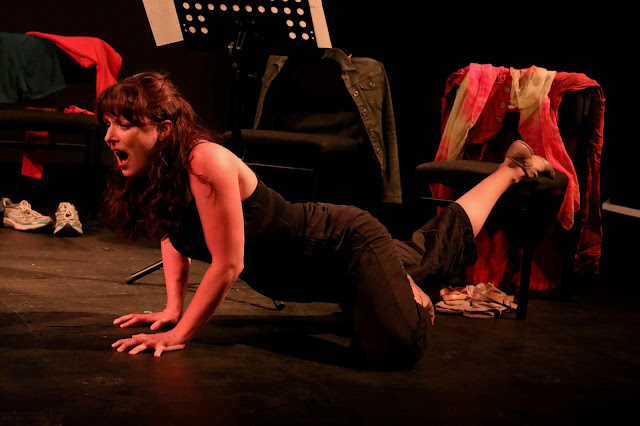 |
| Rania Chrysostomou & Sarah Parkin: On Being Vocal - Sarah Parkin - Tête à Tête at the Cockpit (Photo: Claire Shovelton) |
Rania Chrysostomou & Sarah Parkin: On Being Vocal; Sarah Parkin, director: Sarah Parkin & Rania Chrysostomou, filmmaker: Catherine Valve; Tête à Tête at the Cockpit
Reviewed by Florence Anna Maunders, 10 September 2023
Intriguing and intense operatic exploration of women's hidden stories
A truly collaborative creation between the British/Cypriot composer Rania Chrysostomou and the Canadian/French soprano Sarah Parkin, On Being Vocal, was presented on 10 September 2023 at the Cockpit as part of Tête à Tête: the Opera Festival. This short opera managed to squeeze an enormous amount of content and variety into a running time just over half an hour. In the setting of a women's support group, and aided by Catherine Valve's projected film, Parkin took on the six different roles, each with its own distinct characterisation and musical voice.
Starting with a nice touch of scene setting – a short film showing the women arriving one-at-a-time to a semicircle of chairs, the action moved to the stage itself, the same arc of chairs recreated, in the real. Initially inhabiting the character of the group leader, and then the other women, Parkin moved from chair to chair, using a few props to clearly establish her multiple roles, each of which had its own aria or song, so that in this manner the work's structure was delineated by the changing characterisations.
The group leader started with a spoken introduction, which played with the dramatic irony of addressing empty chairs, with words that could be felt as being addressed instead towards the audience – the kind of deft touch which underlaid the whole work – and which led into a breathing exercise and then an extended haunting, wordless vocalise, at first hummed before Parkin demonstrated her purest, most soulful legato.
 |
| Rania Chrysostomou & Sarah Parkin: On Being Vocal Sarah Parkin - Tête à Tête at the Cockpit (Photo: Claire Shovelton) |
Switching smoothly to the next character, and moving seat to indicate this, Parkin immediately seemed to become an entirely different performer, choking, writhing and struggling to make sound, producing bursts of body percussion and finally one, beautifully sung line, before suddenly moving around the circle to transform once more. This third role mixed swooping sprechstimme, spoken phrases and floated lyrical phrases, blending self reflection with warnings against dreaming.
Moving around the arc once more, Parkin next became stuck in an extended loop of wordless humming and vocalising, repeating the same few notes obsessively, clutching and clawing at herself and the chair, as if unable to escape some unspoken inner turmoil or torment, eventually breaking down both musically and physically in an ever more virtuosic vocal display, before returning to the quiet, calm repetitions with which she began. This was an utterly mesmeric display, and seemed to be the emotional heart of the piece, the “slow movement” of this vocal symphony.
By contrast, the penultimate role was certainly a kind of scherzo, a comedic interlude featuring glitchy beats, parody adverts and “Tik-tok videos” projected behind Parkin, as if we were viewing the screen of the phone she held in the middle of the stage. The rapid changes of sound, movement, video and Parkin's responses to them with voice and dance formed a quirky, inwardly looking counterpoint of sorts. Finally, the last character turned out to be a whole collection of characters, seen and heard in spoken quotes, outbursts and exclamations each with different accents and attitudes, which continually interrupted a breathlessly expressive and declamatory line.
There was an incredible amount of content and variety packed into the six or seven short episodes of this piece – a genuine tour de force of imagination from composer Rania Chrysostomou, and this, combined with Parkin's versatility and uncanny ability to rapidly switch style and character – in some cases in the same vocal line – ensured that this was a half hour full of switchback changes and genuine surprise and delight.
Reviewed by Florence Anna Maunders
Never miss out on future posts by following us
The blog is free, but I'd be delighted if you were to show your appreciation by buying me a coffee.
Elsewhere on this blog
- The juxtaposition of extreme eras of music makes people think about what is fascinating in the music: Ukrainian pianist Vadym Kholodenko on his London Piano Festival programme - interview
- Drawing us into Handel's magical world: Amadigi di Gaula from the English Concert & Kristian Bezuidenhout with Tim Mead, Mary Bevan, Hilary Cronin, Hugh Cutting - opera review
- A terrific sense of relish: Charles Court Opera's new version of The Mikado delights at the Arcola Theatre - opera review
- Why the wait? Ethel Smyth's first major success, Der Wald, finally receives its premiere recording in a terrific account from John Andrews and BBC Symphony Orchestra - record review
- Vivid and strong-minded performances: Bach's Harpsichord Concertos from Steven Devine and the Orchestra of the Age of Enlightenment - record review
- Ravishing sounds and superb musicality: In Search of Lost Dance, Linos Piano Trio in Ravel - record review
- Polite pastoral: Handel's Tolomeo from Baroque Encounter - opera review
- Mesmerising chamber drama: Dani Howard & Joseph Spence's The Yellow Wallpaper from The Opera Story - opera review
- A glimpse into the lively musical life of 18th-century Dublin: Smock Alley from Carina Drury's ensemble Irlandiani - record review
- Tragédie lyrique given with great sympathy and style: Passion from Véronique Gens with Les Surprises, Louis-Noel Bestion de Camboulas at Bayreuth Baroque Opera Festival - opera review
- From Purcell and Handel to Ignatius Sancho and Duke Ellington: American countertenor Reginald Mobley at Bayreuth Baroque Opera Festival - concert review
- Home

.jpg)









No comments:
Post a Comment